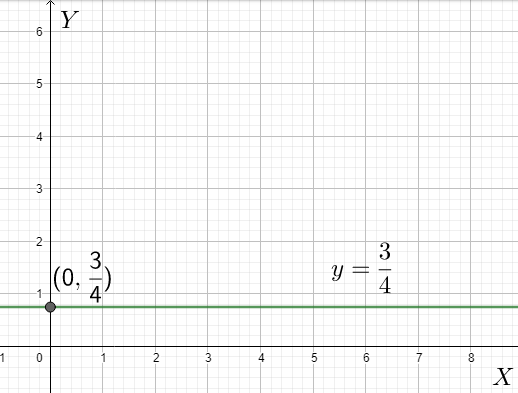Question
Question: How do you graph \[y=\dfrac{3}{4}\] using intercepts?...
How do you graph y=43 using intercepts?
Solution
To solve this problem, first if all we need to transform the given equation into its intercept form. After doing so, we compare it with the standard intercept form of a straight line. After comparing these two equations or forms, we can find out each intercept. Here, the y-intercept comes out to be 43 and the x-intercept as infinite.
Complete step by step answer:
Every straight line equation can be expressed in the intercept form which is,
ax+by=1 .... Equation 1
Where, a is the x-intercept and b is the y-intercept.
The equation of the straight line given in the question is,
y=43
Dividing both sides of the equation by 43 we get,
43y=1 .... Equation 2
In this equation 1, we find no term involving x. That means, the coefficient of the x-term is 0. In equation 1, the coefficient of the x-term is a1 . Thus, comparing equation 2 with equation 1, we get
a1=0
Taking reciprocal on both sides of the equation,
a=01
a→∞
This means that the x-intercept of this line is infinite, or it intersects the x-axis at infinity. In other words, this line is parallel to x-axis. Also, after comparing equation 1 and equation 2 , we see that b=43. This means that the y-intercept is 43 .
Therefore, the line will be a line parallel to the x-axis with a y-intercept as 43. The graph is shown below.

Note:
There is an alternate method to solve this problem. But, this requires us to have complete understanding of straight lines. The line given is
y=43
We can clearly see that this is a y=c line, which means that whatever be the value of x, the corresponding value of y remains the same. This indicates a line parallel to x-axis. The offset of this line from the x-axis is the constant value of the equation.
